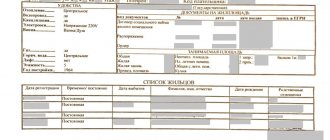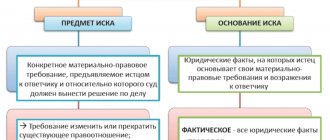How to expel a person from an apartment without his consent: legislation
You can discharge a tenant without his consent on the basis of several laws:
| Law | Explanation |
| Art. 31 Residential Complex of the Russian Federation | When a family relationship ends (for example, divorce), a person loses the right to use housing. But the court may reserve this right for a former family member for a certain period if he has nowhere to live |
| Art. 35 Residential Complex of the Russian Federation | If the right to use housing is terminated, the citizen is obliged to leave it within the period established by the owner. If a person uses the premises on the basis of a will or a court decision, but not for its intended purpose or allows its destruction, the owner has the right to set him a reasonable period to eliminate the defects. If the situation repeats, the owner can evict him by court decision |
| Clause 31 of the Decree of the Government of the Russian Federation of July 17, 1995 No. 713 “On approval of the Registration Rules...” | Deregistration is possible by court decision if the owner filed a claim to terminate the right to use the housing, and it was satisfied. Registration can also be canceled if a person is declared dead or missing |
| Art. 209 Civil Code of the Russian Federation | The owner has the right to dispose of the property at his own discretion. You can only write out someone other than the owner |
| Clause 2 Art. 292 Civil Code of the Russian Federation | Alienation of property rights is the basis for the expulsion and eviction of family members of the previous owner |
Note! A citizen can be discharged from an apartment without his consent only through the court. If he agrees, but for some reason cannot submit an application for deregistration to the Department of Internal Affairs of the Ministry of Internal Affairs in person, he has the right to appoint a representative by notarized power of attorney, and he will be able to do without going to court.
Features and nuances
Despite the extensive list of cases when a person’s discharge through the court is possible, there are a number of exceptions. They apply to certain categories of people who cannot be legally deprived of their registration.
Possible problems with leaving privatized housing
At the time of privatization of the apartment by the spouses, both have the right to it . And someone may refuse to undergo this procedure.
In this case, the person is not the owner, but it is also impossible to write him out.
The court is a little more loyal to similar statements, where we are not talking about spouses, but simply about people who are related. Refusal to privatize is not grounds for deprivation of registration in the future , but it’s worth a try.
You can try to persuade him or find a reason that is considered valid by the court. For example, long absence and living in another place.
The former relative is unable to purchase his own property
Although clause 4 of Art. 31 of the Housing Code implies the possibility of expelling a person from living quarters in the event of a divorce, and it also specifies the nuances. The court may make an exception if the former spouse does not have the opportunity to purchase his own housing and the right to use any other housing , as well as due to poor financial situation or other circumstances that do not allow him/her to provide himself with a place of residence.
This does not mean that it is impossible to write it out at all. But in such cases , the court may set a certain period during which former relatives will be able to use this residential premises .
If the owner also fulfills alimony obligations to the people being discharged, then he may be required to provide them with other housing.
Minors
This category is the most problematic even in cases where parents simply want to change one apartment to another. Under no circumstances can a minor be discharged. The only exception is if he has additional living space .
Pensioners
Pensioners usually face approximately the same difficulties as minors - the court refuses to discharge them against their will.
In this case, you need to provide evidence that the person being evicted has additional housing .
Most situations where a person is deprived of his registration against his will end in a positive court decision, if there are good reasons for this.
In some cases, this requires more time and workarounds, but it is almost always possible to discharge a tenant if desired, although sometimes it may require the assistance of an attorney.
Difficulties may arise when discharging not only children and pensioners, but also other categories of citizens. You can learn more about this from the following publications by our experts:
- Is it possible to sign a person out of an apartment without his presence and consent, and how legal is this?
- On what grounds can a disabled person be discharged from an apartment without his consent?
- Is it possible to somehow discharge a person who is in prison from an apartment?
- How to properly discharge a deceased person from an apartment?
How to discharge a tenant without his consent: reasons
Most often, people turn to the courts to demand an extract from their own apartments for several reasons:
- Transfer of ownership as a result of inheritance or gift, if the testator or donor registered other people’s real estate at the address. The new owner does not need outsiders, and to resolve the issue he has to file an application in court.
- Buying an apartment with registration. This is a classic: the seller does not warn about unregistered relatives, the buyer does not require an extract from the house register. As a result, it turns out that there are people registered in the living space, and they have to be discharged through the court.
- Divorce from your spouse. If the apartment does not belong to common property, after the divorce the owner may demand termination of the right of use by the other party. This automatically entails cancellation of registration and eviction.
- The registered person does not actually live in the apartment. It is not easy to discharge a non-resident person from an apartment. If a citizen is declared missing, the situation becomes simpler.
- The tenant violates the rights of other residents: he regularly throws parties, invites dubious characters, and indulges in alcohol or drugs.
- The registered person uses the property for other purposes: for example, if the apartment belongs to the non-residential stock, but he did not transfer it to non-residential premises and opened a store there.
Note: it is not always possible to write out and not everyone. Not everyone has the right to file a claim either. The requirement must indicate termination of the right to use housing. If you demand eviction, the prosecutor will become involved in the case, and its consideration will be delayed (Article 45 of the Code of Civil Procedure of the Russian Federation).
How to discharge a temporarily registered person without his consent? Step-by-step instruction
Is it possible and how to discharge a person from an apartment without his presence?
Discharge of a former spouse without obtaining consent
If it was not possible to separate from your ex-spouse peacefully, in some cases you can try to discharge him through the court. When the apartment was purchased before marriage or for other reasons belongs only to the wife or husband, everything is clear. The second spouse will be evicted by court decision in accordance with Art. 31.
If the apartment is in common ownership, it will not be possible to evict the ex-spouse.
The situation is different with a municipal apartment - spouses have equal rights to live in it. In this case, you can part with your former life partner only if he/she violates the rules of residence: does not pay, behaves antisocially, and so on.
But what does it take to discharge such a roommate? Contact the owning authorities and report violations. They can begin legal proceedings to deregister.
Details on how to expel your ex-husband from your apartment.
Who has the right to check out of the apartment?
Only the owner has the right to demand that a person be evicted from an apartment, provided that the citizen being evicted does not have ownership rights to the share. If the property is in shared ownership, the owner who wants to evict the second owner must first challenge the ownership of the share, while simultaneously demanding deregistration and eviction. In practice, this is almost impossible to do.
A citizen who does not have ownership rights to housing cannot file a claim for termination of the right to use. If there is a tenant in the apartment who is disturbing everyone, it is more logical to discuss this issue with the owner so that he can file a claim.
When it is almost impossible to discharge for antisocial behavior
A popular reason for initiating removal from a municipal apartment is the tenant’s antisocial behavior. Of course, a similar question can be raised in relation to the owner of a private apartment, but here along the way you will encounter a number of difficulties with justification and proof.
A forced discharge in court for indecent behavior of a tenant who is not the owner of the property may be based on the following actions:
- excessive consumption of alcoholic beverages;
- scandals and screams, especially in the evening;
- constantly listening to loud music and so on.
At the same time, the behavior should cause complaints from other residents and neighbors. Evidence may include witness statements and police calls.
However, it is almost impossible to discharge the owner through the court under the same circumstances. As practice shows, his behavior is punishable only by administrative penalties.
Ownership is increasingly becoming the first thing the court looks at.
Is it possible to discharge a person from a privatized apartment?
According to Art.
19 Federal Law dated December 29, 2004 No. 189-FZ “On the entry into force of the Housing Code of the Russian Federation”, it is impossible to write out a person who has refused privatization. He has the right of indefinite residence. It is important that at the time of privatization he has equal rights with the owner. But there are exceptions in which deregistration is possible:
- The citizen does not live in the premises for a long time. A specific period is not established by law, but in practice the courts evict after three years.
- The person has moved to a permanent place of residence and will no longer live in the old apartment. It is important that the departure is not temporary. If a citizen is absent for work or study, he cannot be discharged.
- The citizen left voluntarily. If he moved out because of a scandal with his loved ones and reports this to the court, the claim will be rejected.
- A person has not paid utility bills for at least three years.
Legal advice: before going to court, it is advisable to collect consent for the deregistration of a specific citizen from other family members: registered owners. This will make the procedure a little easier. If at least one owner objects to the eviction at the meeting, there is a possibility that the claim will not be satisfied.
The application has been submitted, what next?
There is good communication between the State Services portal and the department, so the application is promptly sent to where it is needed. Now you need to track the status of the application in your personal account or the mobile application of the state portal. As soon as the request is processed, a corresponding notification will appear - it will also be duplicated by email address.
The applicant will receive information that he can go to the selected unit of the Ministry of Internal Affairs; he must take his passport with him. The employee will check the passport data and those indicated in the online application for an extract on the State Services. If everything is in order, the corresponding stamp is affixed to the passport.
The extraction procedure is free for citizens; there is no need to pay state fees. The period for providing public services is 3 working days.
Features of the removal of residents from the owner’s apartment
There are certain categories of citizens whom it is impossible or difficult to discharge, or you can do without going to court:
- Minors.
- Those sentenced to imprisonment.
- Conscript soldiers.
- Deprived of parental rights.
- Recognized as missing or dead.
Let us consider in detail how to discharge a person from his own apartment if he belongs to one of the listed categories.
Children
According to paragraph 14 of the Resolution of the Plenum of the Armed Forces of the Russian Federation dated July 2, 2009 No. 14 “On some issues...”, even after the parents’ divorce, a minor child retains the right to use their housing. It will not be possible to discharge the child.
Note! It is also impossible to discharge a minor grandson or granddaughter, even if they were registered in the apartment of their grandmother or grandfather by one of the parents who is registered there at their place of residence. Courts usually refuse to satisfy such demands, citing the fact that the owner cannot recognize the child as a former family member. The only way out is to sell or donate the property. Then the minor will be discharged on the basis of clause 2 of Art. 292 of the Civil Code of the Russian Federation, but the new owner will have to deal with this.
Convicts
A person sentenced to imprisonment can be discharged from his apartment without going to court. But at the end of the period, he has the right to restore registration. If the owner prevents this, he will be able to obtain occupancy through the court.
Conscripts
Those called up for military service are registered at the place of service. Old registration is canceled automatically. Upon returning from the army, it is possible to restore registration at the old address.
Declared dead or missing
To recognize a person as dead or missing, you need to go to court. When the court decision comes into force, the owner has the right to remove the citizen from registration on its basis. Additionally, you will not have to go to court.
Deprived of parental rights
If a mother or father is deprived of parental rights, they lose the opportunity to live with the child. Housing remains with the minor, and the parent is discharged. The child himself can use the property of the deprived father or mother.
How to be discharged from a home according to the general rules
There will be no difficulties if you take care of the discharge procedure yourself before or after your change of residence. Both options have their own characteristics. If you are discharged before changing your residence, then you need to write an application to the Federal Migration Service along with the necessary documents. Upon arrival at your new place of residence, you receive an address sheet and present this document for subsequent registration.
This option is not convenient because it requires going through the procedure twice. In addition, until you register at a new place of residence, you are legally considered homeless.
The second option is more expedient and suitable for those who know where they will register in the future. Upon arrival at your new residential address, you come to the local UVM to register. In the process of applying for a new registration, the old registration is canceled. You do not need to go through the registration procedure twice.
How a property owner can register a registered person: step-by-step instructions
First, the owner needs to send a written notice demanding to sign out. But this is not always required. Subsequently, the procedure will consist of several stages:
- Preparation of documents.
- Notice to the defendant.
- Submitting documents to the court.
- Preliminary meeting.
- Litigation.
- Obtaining a court decision.
- Eviction of the defendant.
Let us consider in detail how to discharge a registered person from your own apartment through the court.
Step 1: Send a notice to check out
If the owner of the premises has previously registered a stranger or a citizen who is not a close relative, he needs to send a notice demanding that he vacate within a month after receiving the document. Close relatives and people registered by the previous owner of the apartment do not need to be notified.
Note: the request is sent by registered mail with acknowledgment of receipt. If a citizen ignores it, after a month from the date of receipt of the document, the owner has the right to go to court.
Contents and sample notice
The notification must include the following information:
- From whom and to: Full name, address.
- Apartment address.
- The date from which the evicted citizen lives in the apartment, the basis of residence.
- Request for deregistration and eviction.
- Date of compilation and signature.
Sample notification
Step 2: preparing documents for the court
To be discharged from an apartment without consent by court, you will need:
- statement of claim;
- passport;
- an extract from the Unified State Register confirming ownership;
- extract from the house register;
- an extract from the personal account if the defendant does not pay utilities;
- divorce certificate if you need to evict your ex-wife or husband;
- the document on the basis of which the right of ownership arose: a contract of sale, exchange, donation, rent, certificate of inheritance;
- technical documents for an apartment or house with a plot of land.
Legal advice: it is better to bring original documents to court. If necessary, the secretary or assistant judge will make copies of them, and the originals will be returned.
Note: if the property is in shared ownership, it is not necessary to involve the second owner as a plaintiff. He will participate in the proceedings as a third party who can express his opinion on the case of termination of the right to use the premises.
Proof
The plaintiff will need evidence confirming the existence of grounds for eviction of the defendant:
- certificates of payment for utilities, if the defendant does not pay for them;
- a certificate from the police department about the absence of calls to the address to confirm that the defendant left voluntarily;
- a certificate from the district police officer confirming that the defendant has not lived in the apartment for a long time;
- certificates from the Pension Fund of the Russian Federation and the Federal Tax Service about the place of work and the address of actual residence of the citizen.
Witnesses may also be invited to testify. It is better to apply for their summons in advance.
Contents and sample of the statement of claim
The statement of claim is drawn up in a number of copies equal to the number of parties. Plus one more remains in court. For example, if the case has one plaintiff and one defendant, three copies are needed.
What information is indicated in the application:
- Name, address of the court.
- Full name, address, telephone number, passport details of the plaintiff.
- Full name, registered address of the defendant.
- Information about the third party (if any): Full name, address, name.
- Information about the apartment: address, area, cadastral number, number of rooms.
- Number, date of registration of the document on the basis of which the plaintiff transferred ownership of the real estate.
- FULL NAME. and the year of birth of the citizen permanently registered in the living space.
- Grounds on which the right to use the premises should be terminated.
- Request for termination of the right to use residential premises.
- List of attached documents.
- Date of registration and signature of the plaintiff.
Step 3: sending the statement of claim to the defendant
One copy of the statement of claim must be sent to the addresses of the defendant and a third party by a valuable letter with a list of the attachments. The defendant's address will be considered the address of the apartment from which he must be discharged. Even if he does not live there, he will be considered properly notified.
Note! Along with the application, an extract from the Unified State Register and other documents are sent, except for a copy of the passport and the agreement on the basis of which the property right is registered.
Step 4: Submitting documents to the court
The statement of claim and other documents are submitted to the district or city court at the defendant’s registered address (Article 28 of the Code of Civil Procedure of the Russian Federation). You should contact the reception. There they will issue a receipt for payment of the state fee (300 rubles). You can pay it at any bank, taking a check with you - you need to bring it to the court to confirm the transaction.
A receipt for payment of the state fee and a notification of delivery of the application to the defendant are submitted to the court along with the other prepared documents. In return, the plaintiff receives one copy of the application with a stamp of registration in court.
Step 5: Preparing for the trial
During preparation, a preliminary meeting is held. On it, the judge clarifies the claims, requests additional evidence for termination of the right of residence, the telephone number and actual address of the defendant. Usually the pre-hearing is held 20-30 days after the statement of claim is registered.
Step 6: participation in the court hearing
During trials, the opinions of the parties are heard, evidence is studied, and witnesses are interviewed. If the defendant has not lived in the apartment for a long time, the plaintiff should refer to the fact that he moved out voluntarily, does not pay utility bills, and does not participate in the costs of repairs and maintenance of the housing.
If there is a subsequent failure to appear, the court has the right to make a decision in absentia without his participation.
Step 7: Obtaining a Judgment
If the decision is made with the participation of the defendant, it comes into force one month from the date of adoption in final form. The default judgment comes into force 7 days from the date of receipt by the defendant (Article 237 of the Code of Civil Procedure of the Russian Federation). The certified copy must be picked up after you have learned about its readiness by calling the office. It is usually issued within 5-10 days.
Note! The defendant may, within 7 days from receipt of the decision, file an application for its cancellation. If the court ruling rejects the application, an appeal is filed to cancel the decision within one month from the date of the ruling.
Step 8: Evicting the Defendant
When the decision comes into force, the plaintiff must submit a copy of it to the Department of Internal Affairs of the Ministry of Internal Affairs in order for the defendant to be discharged. Deregistration is carried out within three days. As a result, a new certificate of registered persons will be issued, and the defendant will no longer be on it.
Legal advice: people often refuse to leave their home after being deregistered through the court. In such a situation, the owner has the right to change the lock in the absence of a written lock. Even if he calls the police and demands to be let in to take things away, this is not necessary: the owner of the property can dispose of it himself as he pleases and not allow strangers there.
Discharge of a person to nowhere
As a rule, the court pays attention to whether the person being discharged has another living space for registration. This is especially true for minors. As a general rule, they can be discharged from housing only upon subsequent registration in another place.
But sometimes not having another place to live doesn't matter. This happens when there is a change of ownership. The new owner has no relation to those who were registered by the previous one, so according to the law, people can be discharged to nowhere.
To understand whether the owner of the house can discharge a relative to nowhere, you need to reason based on the degree of relationship and circumstances. Most often, such an extract occurs on a general basis. But relatives cannot be expelled from an apartment in which they could have received ownership rights, but abandoned it during privatization.
More about whether it is possible to leave the apartment for nowhere.
How to discharge a person registered from an apartment: expenses
Before deregistering an illegally registered person, you need to weigh all the costs:
- State duty to court - 300 rubles.
- Ordering duplicate documents from Rosreestr – from 1,000 rubles. per copy (in case of loss).
- Sending statements of claim to all participants in the process - on average 500-1,000 rubles.
- Drawing up a statement of claim from a lawyer - from 1,000 rubles.
- Legal support on a turnkey basis - from RUB 35,000. depending on the region and the company’s price list.
- Obtaining certificates from the HOA - on average 100-200 rubles.
Note: in total, if the plaintiff conducts the case independently, he can pay 3,000 rubles. If the claims are satisfied, he has the right to recover legal costs from the defendant (Article 98 of the Code of Civil Procedure of the Russian Federation).
Deregistration at the place of residence through State Services
To receive a service through the “State Services” portal, you must be registered on this site and complete the following steps:
- go to the State Services website;
- click on the “Registration at your place of residence” section;
- select the required service:
- registration of a citizen at the place of residence;
- registration of a citizen at the place of residence;
- deregistration at the place of residence;
- deregistration of a citizen at the place of residence;
- fill out an application electronically;
- send an application;
- wait for the results of its verification;
- At the appointed time, visit the department of the Main Department of Migration Affairs of the Ministry of Internal Affairs and obtain documents.
How to discharge someone from an apartment without a person’s consent: judicial practice
Most often, plaintiffs file applications for termination of the right to use by other citizens, when there are indeed grounds, and the claims are usually satisfied:
- Claim for termination of the right of use, collection of legal costs, eviction due to failure to fulfill obligations under the loan agreement (Decision No. 2-577/2020 2-577/2020~M-106/2020 M-106/2020 dated April 29, 2021 on the case No. 2-577/2020). The requirements are satisfied in full. The defendant was evicted and the costs of paying state fees were collected from him.
- On recognizing the defendant as having lost the right to use the apartment. The plaintiff and her husband bought a home where the defendant was registered. He was not discharged within the established time frame (Decision No. 2-224/2020 2-224/2020~M-171/2020 M-171/2020 dated April 29, 2021 in case No. 2-224/2020). The requirements have been satisfied.
- The plaintiff registered the defendant in his apartment; she needed registration for employment. Then he wanted to write her out, the court asked to recognize the housing legal relationship as not having arisen (Decision No. 2-300/2020 2-300/2020~M-122/2020 M-122/2020 dated April 29, 2021 in case No. 2-300/ 2020). The requirements have been satisfied.
How to protect your rights?
It is obvious that, even with privatization, even with municipal housing, it is quite difficult for a person to be discharged. Owners have to diligently prove their rights in court, hoping that the registration can be canceled. To achieve a positive result, you need to have an excellent knowledge of the laws. For this reason, they often have to turn to professional lawyers to prove that the registered tenant cannot live with them.
The basis is as follows: the owner needs to justify that the person does not live or have personal belongings in the apartment. The tenant does not pay utilities and does not use any resources. In addition to documents, it is a good idea to have as support the testimony of neighbors who will confirm or refute the facts.
The ideal way is to reach an agreement with the person who does not want to be discharged. There are many cases in practice where people have found ways to find a common solution and resolve the issue without involving the court. However, if both parties or one of them constantly misses meetings, then the case can drag on for many years.
Lawyer's answers to private questions
Can they discharge me without my consent, without going to court?
No. Registration is canceled only by mutual agreement of the parties. An exception is when a citizen is serving in the MLS or in the army. But even here, the Department of Internal Affairs of the Ministry of Internal Affairs rarely meets the owners halfway and discharges citizens, although by law they can do this without their knowledge.
Is it easy to sign a person out of an apartment? How long do court proceedings take?
It’s easy if the owner already has experience in conducting legal cases and there are all grounds for terminating the right of use. If he does not have such experience, it is better to contact a lawyer. The case is considered in court for about two months: a preliminary hearing is scheduled 10-20 days from the date of registration of the application, a trial is scheduled after another half a month. Typically, such applications are considered in one hearing if all parties are present.
I bought an apartment with my wife and it is registered in my name. Now they are divorced, but she is registered there. How can I write her out?
You can’t just write your ex-wife out: she’s just as much an owner as you are. First you need to divide the housing. According to Art. 34 of the RF IC, all property acquired by spouses from the moment of marriage until divorce is considered common property. Even if the property is registered in your name, by law it belongs to you and your ex-wife 50/50, but it must be divided. It will be possible to write it out only if the court leaves the apartment to you in exchange for compensation for her share.
Is it possible to discharge a disabled person from an apartment without his consent?
If there are grounds, anyone can be discharged, except minors. There is no separate law protecting the right of disabled people to live in apartments or other housing.
The owner wants to check me out of the apartment without my consent. How can I protect my rights and interests?
First you need to understand on what basis the owner is demanding eviction. If you live in his apartment and acquired the right to use it after he became the owner, he has little chance. If he bought a home where you are registered, and at the time of signing the contract with the seller he did not know about it, it is easier to cancel the registration. An exception is a purchase and sale agreement with the right of lifelong residence of a third party: the court cannot evict him from his living space. To protect your interests, you need to provide evidence confirming your actual residence and fulfillment of obligations: utility bills, other documents. It is advisable to obtain testimony from witnesses.
What to do if it is not possible to submit documents in person?
There are two ways to extract without personal presence: by proxy through a personal representative or using the multifunctional State Services portal. However, before considering options for discharge without visiting the UVM, let’s establish the reasons for deregistration without personal presence:
- Automatic cancellation of registration. We have already said that when you arrive at a new place of residence, the registration ceases to be valid for the old one.
- Using the website for the provision of public services. You can submit your application remotely.
- Serious illness, stay in another locality (for example, a business trip), departure to another country - in these circumstances, a power of attorney is issued.
In addition to these situations, serving a sentence in a prison camp or performing military service are considered indirect reasons. In all of the above situations, visiting the UVM is impossible. Let's look at how to check out of your home without visiting a government institution.









